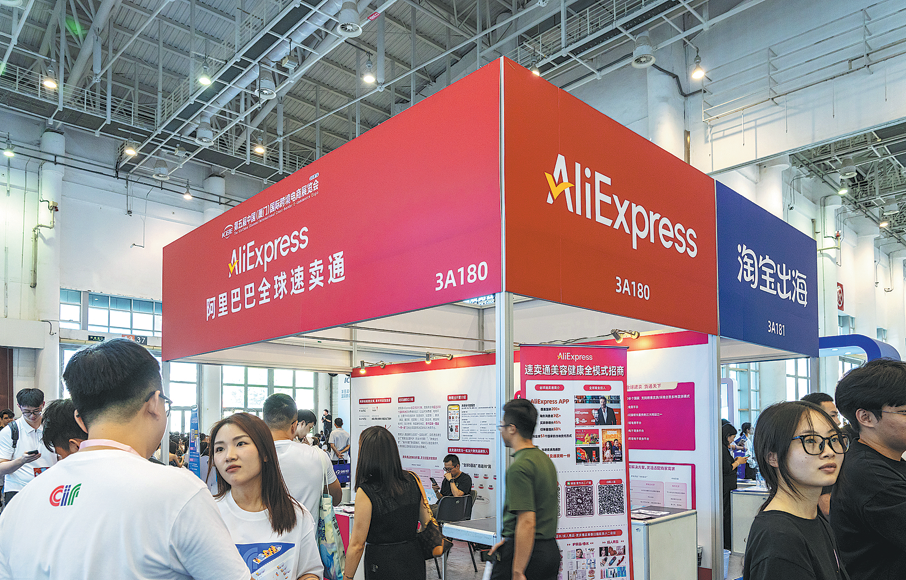E-tailers roll out 11.11 globally for growth


China's Singles Day shopping carnival, the biggest shopping event worldwide, is becoming more international with Chinese e-commerce companies speeding up their overseas expansion and driving rapid growth in international markets, according to a new report from global consultancy Bain & Company.
Alibaba Group's online marketplace Taobao is gearing up to launch simultaneous promotions in 20 countries during the shopping spree, also known as Double Eleven, highlighting its accelerated globalization strategy.
This move not only demonstrates the global influence of the Double Eleven promotional gala, but also reflects the proactive exploration of Chinese e-commerce companies in overseas markets, the consultancy said.
In the Southeast Asian market, Chinese e-commerce players account for as much as 50 percent of business-to-consumer e-commerce gross merchandise value, or GMV, in Indonesia, Thailand and the Philippines.
Beyond the region, Alibaba's cross-border e-commerce platform AliExpress, Shein and Temu have established a solid presence across Latin America, the Middle East and parts of Europe. The global expansion has been fueled by China's preeminence in e-commerce and the speed at which the domestic market continues to evolve, the report said.
Han Weiwen, senior partner and Asia-Pacific retail practice leader at Bain & Company, said Taobao's expansion into 20 markets during this year's Singles Day shopping festival is a clear sign of Chinese e-commerce globalization, and the scale of China's innovations gives it unique advantages abroad.
"Leveraging the innovation capabilities accumulated in the domestic market, Chinese e-commerce firms have already established a unique competitive advantage worldwide," Han said. He added that against the backdrop of slowing domestic growth and rising international scrutiny, the next phase will be won by players that pair innovation with disciplined execution — market by market.
The report noted that the Chinese e-commerce market has shifted from traditional models to a new retail format driven by social media, with an instant delivery system established.
Faced with intense competition from the domestic market, Chinese e-commerce companies have a number of core capabilities, including rapid product iteration, creativity-driven demand generation, accelerated fulfillment and delivery, and widespread application of artificial intelligence, laying a solid foundation for their overseas expansion.
Chinese retailers are likely to have realistic expectations about GMV growth for this year's Singles Day promotional event, and are using the occasion to showcase innovation. However, the relatively slowing growth of China's e-commerce market highlighted a need for Chinese e-commerce companies to accelerate their overseas expansion and find new growth engines.
The report said Chinese e-commerce platforms are facing difficulties and challenges in their global expansion due to tightened regulations overseas, formidable local competition and differences in consumer habits across different markets.
In response to these challenges, Chinese e-commerce companies are advancing localization strategies. Through mergers and acquisitions or partnerships with local firms, they are accelerating steps to enter local markets.
"The internationalization of Chinese retail is entering a new phase," said Han. "As Chinese players adapt to local customers, culture and rules abroad, we can expect more M&As."
Han added that Chinese e-commerce companies should continue to leverage their disruptive innovation capabilities, while using their leading experience in the domestic market to accelerate global expansion and strive to be successful.
Chinese e-commerce platforms are exploring more opportunities in emerging markets to enable merchants to reach potential overseas customers, thus propelling the growth of cross-border trade, said Mo Daiqing, a senior analyst at the Internet Economy Institute, a domestic consultancy.
To make inroads into overseas e-commerce markets, Chinese online retailers should adjust product strategies and service models in accordance with the needs of various countries and regions, and strengthen the establishment of compliance systems in overseas markets, she added.
Experts also said that unlike in the past, when record-smashing GMV through discount-led sales had come to characterize the Double Eleven promotional campaign, chasing high GMV is no longer the focus now. Chinese shoppers are becoming more rational and carefully review their needs, with an emphasis on the quality and value of commodities, they added.




































